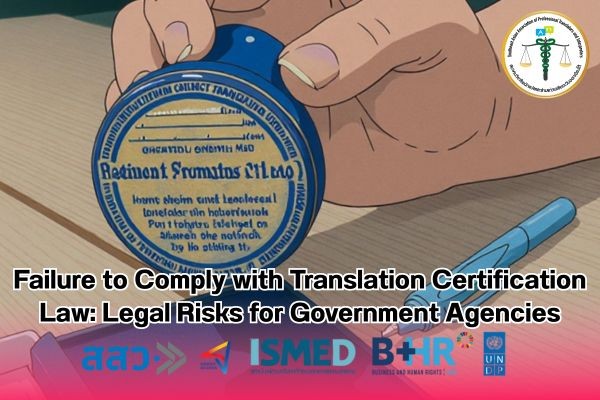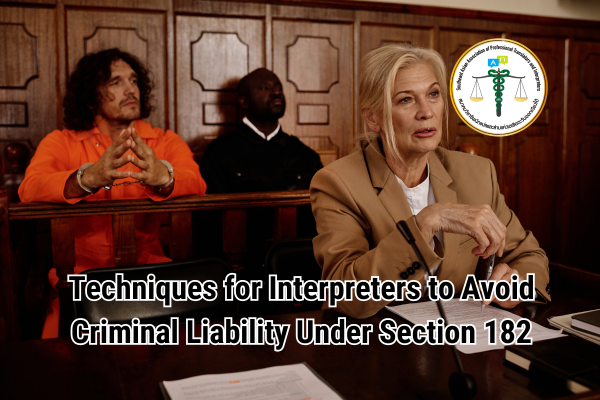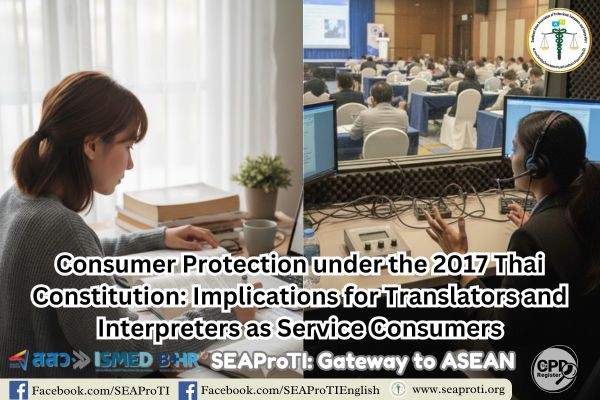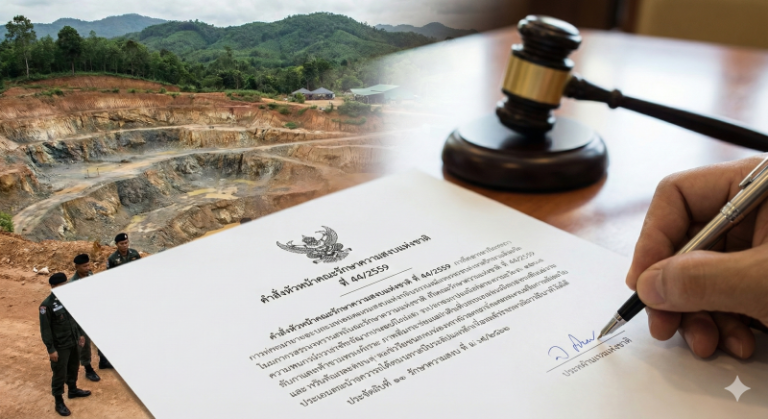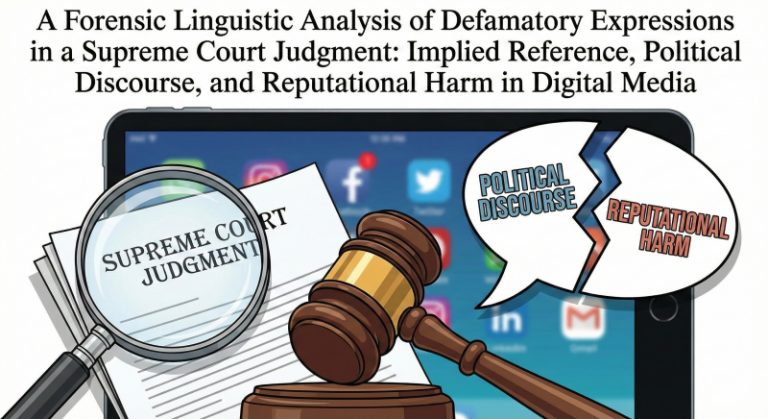Failure to Comply with the Ministerial Regulation of the Ministry of Interior B.E. 2540 on Translation Certification: Legal Consequences and Liabilities of Government Agencies
September 6, 2025, Bangkok – Translating documents from foreign languages into Thai for use in official government proceedings is a process that requires accuracy and reliability, as such documents directly affect the rights and duties of individuals in administrative and judicial processes. The Ministerial Regulation of the Ministry of Interior B.E. 2540 stipulates that only four categories of persons or institutions have the authority to certify translations, in order to ensure accuracy and legal validity. If state agencies fail to comply with these requirements, administrative actions taken therefrom are at risk of annulment, and government officials may be held liable on multiple grounds.
Authorized Translation Certifiers under the Ministerial Regulation B.E. 2540
(1) Thai nationals who have graduated with at least a bachelor’s degree from a program in which the foreign language concerned was the principal medium of instruction.
(2) University lecturers in Thailand who teach the foreign language concerned, which is the language of the source document.
(3) Embassies or consulates of the country of the source language located in Thailand, in cases where that country uses the language as its official language.
(4) Thai embassies or consulates abroad, in cases where the document is to be used overseas.
Note: The Office of the Council of State has proposed enacting a Royal Decree stipulating that registered translators, including translation certifiers from professional associations or accredited language institutions, may also certify translations (Letter to SEAProTI dated April 28, 2025).
1. Illegality of Administrative Acts
According to the Administrative Procedure Act B.E. 2539 (1996), issuing orders or carrying out administrative acts based on evidence that is incorrect or uncertified as required by law may constitute an exercise of power ultra vires, which could be annulled by the Administrative Court under Sections 9 and 72 (Piyabutr, 2017).
2. Disciplinary Liability of State Officials
Officials responsible for reviewing and approving uncertified documents may be deemed to have neglected their duties or performed them unlawfully, in violation of the Civil Service Act B.E. 2551 (2008). Penalties range from reprimand and salary reduction to dismissal or expulsion, depending on the seriousness and the resulting damage (Office of the Civil Service Commission, 2019).
3. Civil Liability (Tort against the State)
Under the Liability for Wrongful Acts of Officials Act B.E. 2539 (1996), if failure to comply with the Ministerial Regulation causes damage to the State—for instance, wrongful issuance of legal rights documents—the State may be liable to compensate the injured party, and the State retains the right of recourse against the responsible officials (Supoj, 2015).
4. Criminal Liability
If officials deliberately accept or use translations that have not been certified, they may be guilty under Section 157 of the Thai Penal Code, which prescribes that any state official who wrongfully performs or omits to perform duties to the detriment of others shall be liable to imprisonment of one to ten years, a fine of 20,000 to 200,000 baht, or both (Thai Penal Code, 2021).
5. Impact on Citizens’ Rights
If government agencies use uncertified translations, affected individuals may suffer harm such as losing property rights, invalid registration of personal status, or rejection of documents abroad. These consequences contravene the principles of protection of citizens’ rights and the rule of law, which are the cornerstones of democratic governance (Dicey, 1959/2013).
Can Government Agencies or Officials Plead Ignorance of the Law?
General Principle: Ignorantia juris non excusat
A universally recognized legal principle, also accepted in Thai law, is that “Ignorance of the law is no excuse.” This means no person may plead ignorance or misunderstanding of the law to avoid liability (Supoj, 2015).
In Thai law, promulgation of legislation in the Royal Gazette is deemed constructive notice to all citizens (Constitution of the Kingdom of Thailand, Section 5; Act on the Publication of Laws and Evaluation of Legal Effectiveness B.E. 2565). Thus, ignorance of the law cannot serve as an excuse.
Government Officials
For government officials, the standard is stricter than for ordinary citizens, because they are duty-bound to comply with laws, ministerial regulations, rules, and proclamations. Pleading ignorance of the law demonstrates dereliction of duty and may amount to “gross negligence” or “malfeasance.”
The Supreme Court has ruled in several cases that government officials cannot plead ignorance of the laws or regulations they are duty-bound to know (Supreme Court Judgments No. 1452/2006; 3210/2013).
Consequences of Pleading Ignorance
- Disciplinary: Ignorance of the law does not absolve liability, though courts or superiors may consider it as a mitigating factor if laws are unduly complex or unclear.
- Civil: The State remains liable for damages caused, even if the official pleads ignorance. The State may seek recourse from the responsible official under the Liability for Wrongful Acts of Officials Act.
- Criminal: If deliberate or unlawful omission is involved, ignorance of the law will not absolve criminal liability; penalties remain enforceable.
Conclusion
Neither citizens nor government officials may plead ignorance of the law to escape liability in administrative, disciplinary, civil, or criminal contexts. At most, ignorance may be considered a mitigating factor if it arises from legal complexity or lack of communication from superiors.
Failure to comply with the Ministerial Regulation of the Ministry of Interior B.E. 2540 on translation certification produces wide-ranging consequences: illegality of administrative acts, disciplinary, civil, and criminal liability for officials, and infringement of citizens’ rights. Therefore, strict adherence to this regulation is essential to uphold the rule of law and maintain public confidence in administrative governance.
References
- Constitution of the Kingdom of Thailand B.E. 2560 (2017).
- Dicey, A. V. (2013). Introduction to the study of the law of the constitution (8th ed.). Indianapolis: Liberty Fund. (Original work published 1959)
- Office of the Civil Service Commission. (2019). Handbook on disciplinary proceedings of civil servants. Bangkok: OCSC.
- Piyabutr, S. (2017). General administrative law. Bangkok: Winyuchon.
- Supoj, K. (2015). Liability for wrongful acts of officials. Bangkok: Thammasat University.
- Supreme Court Judgments No. 1452/2006, 3210/2013.
- Thai Penal Code. (2021). Thai Penal Code. Bangkok: Nititham Publishing.
- The Act on the Publication of Laws and Evaluation of Legal Effectiveness B.E. 2565 (2022).
About Certified Translators, Translation Certifiers, and Certified Interpreters of the Southeast Asian Association of Professional Translators and Interpreters (SEAProTI)
The Southeast Asian Association of Professional Translators and Interpreters (SEAProTI) has promulgated the criteria and qualifications for individuals registered as “Certified Translators,” “Translation Certification Providers,” and “Certified Interpreters” of the association, under Chapters 9 and 10, published in the Royal Gazette by the Secretariat of the Cabinet, Office of the Prime Minister of the Kingdom of Thailand, dated July 25, 2024, Vol. 141, Part 66 Ng, p. 100. Full text available at: Certified Translators, Translation Certification Providers, and Certified Interpreters.
The Office of the Council of State has proposed enacting a Royal Decree to authorize registered translators, including translation certifiers from professional associations or accredited language institutions, to certify translations (Letter to SEAProTI dated April 28, 2025).
SEAProTI is the first professional association in Thailand and Southeast Asia to establish a certification system for certified translators, translation certifiers, and certified interpreters.
Headquarters: Ban Ratchakru Building, No. 33, Room 402, Soi Phaholyothin 5, Phaholyothin Road, Phaya Thai Subdistrict, Phaya Thai District, Bangkok 10400, Thailand.
Email: hello@seaproti.com
Phone: (+66) 2-114-3128 (Office hours: Monday–Friday, 09:00–17:00)
การไม่ปฏิบัติตามกฎกระทรวงมหาดไทย พ.ศ. 2540 ว่าด้วยการรับรองการแปล:
ผลทางกฎหมายและความรับผิดของหน่วยงานราชการ
6 กันยายน 2568, กรุงเทพมหานคร – การแปลเอกสารจากภาษาต่างประเทศเป็นภาษาไทยเพื่อใช้ในการราชการเป็นกระบวนการที่ต้องอาศัยความถูกต้องและความน่าเชื่อถือ เนื่องจากเอกสารดังกล่าวมีผลกระทบโดยตรงต่อสิทธิและหน้าที่ของบุคคลในกระบวนการปกครองและกระบวนการยุติธรรม กฎกระทรวงมหาดไทย พ.ศ. 2540 ได้กำหนดให้เฉพาะบุคคลหรือหน่วยงาน 4 กลุ่มเท่านั้นที่มีอำนาจรับรองคำแปล เพื่อสร้างหลักประกันความถูกต้องและความชอบด้วยกฎหมาย หากหน่วยงานรัฐไม่ปฏิบัติตามหลักเกณฑ์นี้ ย่อมส่งผลให้การกระทำทางปกครองนั้นเสี่ยงต่อการถูกเพิกถอน และเจ้าหน้าที่รัฐอาจต้องรับผิดในหลายมิติ
ผู้รับรองเนื้อหาการแปลเนื้อหาภาษาต่างประเทศเป็นภาษาไทย ตามกฎกระทรวง ปี 2540
(1) บุคคลสัญชาติไทยที่สำเร็จการศึกษาไม่ต่ำกว่าปริญญาตรี โดยเรียนในหลักสูตรที่ใช้ภาษาต่างประเทศนั้นเป็นภาษาหลักในการเรียนการสอน
(2) อาจารย์ในสถาบันอุดมศึกษาในประเทศไทย ที่สอนภาษาต่างประเทศนั้น ซึ่งเป็นภาษาในเอกสารต้นทาง
(3) สถานทูตหรือสถานกงสุลของประเทศเจ้าของภาษาที่ตั้งอยู่ในประเทศไทย กรณีประเทศนั้นใช้ภาษาดังกล่าวเป็นภาษาราชการ
(4) สถานเอกอัครราชทูตหรือสถานกงสุลไทยในต่างประเทศ สำหรับกรณีเอกสารที่ต้องใช้ในต่างแดน
หมายเหตุ: สำนักคณะกรรมการกฤษฎีกาเสนอให้ตราเป็นพระราชกฤษฎีกา โดยกำหนดให้นักแปลที่ขึ้นทะเบียน รวมถึงผู้รับรองการแปลจากสมาคมวิชาชีพหรือสถาบันสอนภาษาที่มีการอบรมและขึ้นทะเบียน สามารถรับรองคำแปลได้ (จดหมายถึงสมาคม SEAProTI ลงวันที่ 28 เม.ย. 2568)
1. ความไม่ชอบด้วยกฎหมายของการกระทำทางปกครอง
ตามพระราชบัญญัติวิธีปฏิบัติราชการทางปกครอง พ.ศ. 2539 การออกคำสั่งหรือการดำเนินการทางปกครองที่อาศัยเอกสารหลักฐานไม่ถูกต้องหรือไม่ได้รับการรับรองตามกฎหมาย อาจถือว่าเป็นการใช้อำนาจ เกินขอบเขตหรือนอกเหนือจากที่กฎหมายกำหนด (ultra vires) ซึ่งอาจถูกศาลปกครองเพิกถอนตามมาตรา 9 และมาตรา 72 ได้ (ปิยบุตร, 2560)
2. ความรับผิดทางวินัยของเจ้าหน้าที่รัฐ
เจ้าหน้าที่ผู้รับผิดชอบในการตรวจสอบและอนุมัติเอกสารที่ไม่ผ่านการรับรอง อาจเข้าข่ายการ ละเว้นการปฏิบัติหน้าที่หรือปฏิบัติหน้าที่โดยมิชอบ อันเป็นการฝ่าฝืนพระราชบัญญัติระเบียบข้าราชการพลเรือน พ.ศ. 2551 ซึ่งกำหนดโทษตั้งแต่ภาคทัณฑ์ ตัดเงินเดือน ไปจนถึงปลดออกหรือไล่ออก ทั้งนี้ขึ้นอยู่กับความร้ายแรงและผลเสียหายที่เกิดขึ้น (สำนักงานคณะกรรมการข้าราชการพลเรือน, 2562)
3. ความรับผิดทางแพ่ง (ละเมิดต่อรัฐ)
ตามพระราชบัญญัติความรับผิดทางละเมิดของเจ้าหน้าที่ พ.ศ. 2539 หากการไม่ปฏิบัติตามกฎกระทรวงก่อให้เกิดความเสียหายแก่รัฐ เช่น การออกเอกสารสิทธิผิดพลาด อาจส่งผลให้รัฐต้องรับผิดชดใช้ค่าเสียหายต่อบุคคลผู้เสียหาย และรัฐมีสิทธิไล่เบี้ยเอากับเจ้าหน้าที่ผู้กระทำการนั้นได้ (สุพจน์, 2558)
4. ความรับผิดทางอาญา
ในกรณีที่เจ้าหน้าที่จงใจยอมรับหรือใช้เอกสารแปลที่ไม่ได้รับการรับรอง อาจเข้าข่ายความผิดตาม มาตรา 157 แห่งประมวลกฎหมายอาญา ซึ่งบัญญัติว่าเจ้าพนักงานผู้ใดปฏิบัติหรือละเว้นการปฏิบัติหน้าที่โดยมิชอบเพื่อให้เกิดความเสียหายแก่ผู้หนึ่งผู้ใด ต้องระวางโทษจำคุกตั้งแต่ 1 ปี ถึง 10 ปี หรือปรับตั้งแต่ 20,000 บาท ถึง 200,000 บาท หรือทั้งจำทั้งปรับ (ประมวลกฎหมายอาญา, 2564)
5. ผลกระทบต่อสิทธิของประชาชน
หากหน่วยงานรัฐใช้เอกสารแปลที่ไม่ถูกต้อง ประชาชนผู้เกี่ยวข้องอาจได้รับความเสียหาย เช่น สูญเสียสิทธิในทรัพย์สิน การจดทะเบียนสถานภาพบุคคลไม่สมบูรณ์ หรือการใช้เอกสารในต่างประเทศถูกปฏิเสธ สิ่งเหล่านี้ขัดต่อหลัก การคุ้มครองสิทธิของประชาชน และ หลักนิติธรรม (rule of law) ซึ่งเป็นรากฐานสำคัญของการปกครองในระบอบประชาธิปไตย (Dicey, 1959/2013)
เจ้าหน้าที่รัฐหรือหน่วยงานราชการ อ้างว่า ไม่รู้กฎหมาย เพื่อหลีกเลี่ยงความรับผิดได้หรือไม่
หลักทั่วไป: “Ignorantia juris non excusat”
หลักกฎหมายที่เป็นสากลและได้รับการยอมรับในกฎหมายไทย คือ
“ไม่รู้กฎหมาย ไม่เป็นข้อแก้ตัว” (Ignorance of the law excuses no one) หมายความว่า บุคคลไม่สามารถอ้างความไม่รู้หรือไม่เข้าใจกฎหมายมาใช้เป็นข้อแก้ตัวเพื่อหลีกเลี่ยงความรับผิดได้ (สุพจน์, 2558)
ในระบบกฎหมายไทย การประกาศกฎหมายใน ราชกิจจานุเบกษา ถือว่าประชาชนทุกคนได้รับรู้กฎหมายแล้ว (รัฐธรรมนูญแห่งราชอาณาจักรไทย, ม. 5; พระราชบัญญัติวิธีการเผยแพร่กฎหมายฯ พ.ศ. 2565) ดังนั้น การอ้างว่าไม่รู้จึงไม่เป็นข้อแก้ตัว
กรณีเจ้าหน้าที่รัฐ
สำหรับเจ้าหน้าที่รัฐ มาตรฐานเข้มกว่าบุคคลทั่วไป เนื่องจาก เจ้าหน้าที่มีหน้าที่โดยตรงในการ ปฏิบัติตามกฎหมาย กฎกระทรวง ระเบียบ และประกาศต่าง ๆ หากอ้างว่าไม่รู้กฎหมาย ยิ่งแสดงถึง ความบกพร่องในการปฏิบัติหน้าที่ และอาจเข้าข่าย “ละเว้นโดยประมาทเลินเล่อ” หรือ “ละเว้นโดยมิชอบ”
ศาลฎีกามีแนววินิจฉัยหลายคดีว่า เจ้าหน้าที่รัฐไม่อาจอ้างว่าไม่รู้ข้อกฎหมายหรือระเบียบที่ตนเองมีหน้าที่ต้องรู้ (คำพิพากษาศาลฎีกาที่ 1452/2549; 3210/2556)
ผลในเชิงความรับผิด
- ทางวินัย: การอ้างว่าไม่รู้กฎหมายไม่สามารถยกเว้นโทษได้ แต่ศาลหรือผู้บังคับบัญชาอาจพิจารณาเป็นเหตุ บรรเทาโทษ หากเห็นว่าเกิดจากความซับซ้อนหรือไม่ชัดเจนของกฎหมาย
- ทางแพ่ง: รัฐยังต้องรับผิดชดใช้ความเสียหาย แม้เจ้าหน้าที่อ้างว่าไม่รู้กฎหมาย และรัฐสามารถไล่เบี้ยจากเจ้าหน้าที่ได้ตาม พ.ร.บ. ความรับผิดทางละเมิดของเจ้าหน้าที่ พ.ศ. 2539
- ทางอาญา: หากเป็นการจงใจหรือละเว้นโดยมิชอบ การอ้างว่าไม่รู้กฎหมายไม่ช่วยให้พ้นผิด โทษยังคงมีผลบังคับ
สรุปส่งท้าย
บุคคลที่เกี่ยวข้องไม่สามารถอ้างว่าไม่รู้กฎหมายเพื่อพ้นผิดได้ ทั้งในเชิงปกครอง วินัย แพ่ง และอาญา แต่ “ความไม่รู้” อาจถูกพิจารณาเป็นเหตุบรรเทาโทษหรือโอนความรับผิดบางส่วน หากพิสูจน์ได้ว่าเกิดจากความซับซ้อนของกฎหมายหรือการขาดการสื่อสารจากผู้บังคับบัญชา
การไม่ปฏิบัติตามกฎกระทรวงมหาดไทย พ.ศ. 2540 เกี่ยวกับการรับรองการแปลมีผลกระทบรอบด้าน ทั้งในเชิงความชอบด้วยกฎหมายของการกระทำทางปกครอง ความรับผิดทางวินัย แพ่ง และอาญาของเจ้าหน้าที่ ตลอดจนการละเมิดต่อสิทธิของประชาชน ดังนั้น หน่วยงานรัฐจำเป็นต้องยึดถือกฎเกณฑ์นี้อย่างเคร่งครัดเพื่อคงไว้ซึ่งหลักนิติธรรมและความเชื่อมั่นในกระบวนการปกครอง
เอกสารอ้างอิง
- คำพิพากษาศาลฎีกาที่ 1452/2549, 3210/2556.
- ประมวลกฎหมายอาญา. (2564). ประมวลกฎหมายอาญา. กรุงเทพมหานคร: สำนักพิมพ์นิติธรรม.
- ปิยบุตร, แสงกนกกุล. (2560). กฎหมายปกครองทั่วไป. กรุงเทพมหานคร: วิญญูชน.
- *พระราชบัญญัติวิธีการเผยแพร่กฎหมายและประเมินผลสัมฤทธิ์ของกฎหมาย พ.ศ. 2565.
- *รัฐธรรมนูญแห่งราชอาณาจักรไทย พ.ศ. 2560.
- สำนักงานคณะกรรมการข้าราชการพลเรือน. (2562). คู่มือการดำเนินการทางวินัยข้าราชการพลเรือน. กรุงเทพมหานคร: ก.พ.
- สุพจน์, ไข่มุก. (2558). ความรับผิดทางละเมิดของเจ้าหน้าที่. กรุงเทพมหานคร: มหาวิทยาลัยธรรมศาสตร์.
- Dicey, A. V. (2013). Introduction to the study of the law of the constitution (8th ed.). Indianapolis: Liberty Fund. (Original work published 1959)
เกี่ยวกับนักแปลรับรอง ผู้รับรองการแปล และล่ามรับรองของสมาคมวิชาชีพนักแปลและล่ามแห่งเอเชียตะวันออกเฉียงใต้
* สมาคมวิชาชีพนักแปลและล่ามแห่งเอเชียตะวันออกเฉียงใต้ (SEAProTI) ได้ประกาศหลักเกณฑ์และคุณสมบัติผู้ที่ขึ้นทะเบียนเป็น “นักแปลรับรอง (Certified Translators) และผู้รับรองการแปล (Translation Certification Providers) และล่ามรับรอง (Certified Interpreters)” ของสมาคม หมวดที่ 9 และหมวดที่ 10 ในราชกิจจานุเบกษา ของสำนักเลขาธิการคณะรัฐมนตรี ในสำนักนายกรัฐมนตรี แห่งราชอาณาจักรไทย ลงวันที่ 25 ก.ค. 2567 เล่มที่ 141 ตอนที่ 66 ง หน้า 100 อ่านฉบับเต็มได้ที่: นักแปลรับรอง ผู้รับรองการแปล และล่ามรับรอง
** สำนักคณะกรรมการกฤษฎีกาเสนอให้ตราเป็นพระราชกฤษฎีกา โดยกำหนดให้นักแปลที่ขึ้นทะเบียน รวมถึงผู้รับรองการแปลจากสมาคมวิชาชีพหรือสถาบันสอนภาษาที่มีการอบรมและขึ้นทะเบียน สามารถรับรองคำแปลได้ (จดหมายถึงสมาคม SEAProTI ลงวันที่ 28 เม.ย. 2568)
*** สมาคมวิชาชีพนักแปลและล่ามแห่งเอเชียตะวันออกเฉียงใต้ เป็นสมาคมวิชาชีพแห่งแรกในประเทศไทยและภูมิภาคเอเชียตะวันออกเฉียงใต้ที่มีระบบรับรองนักแปลรับรอง ผู้รับรองการแปล และล่ามรับรอง
สำนักงานใหญ่: อาคารบ้านราชครู เลขที่ 33 ห้อง 402 ซอยพหลโยธิน 5 ถนนพหลโยธิน แขวงพญาไท เขตพญาไท กรุงเทพมหานคร 10400 ประเทศไทย
อีเมล: hello@seaproti.com โทรศัพท์: (+66) 2-114-3128 (เวลาทำการ: วันจันทร์–วันศุกร์ เวลา 09.00–17.00 น.)


